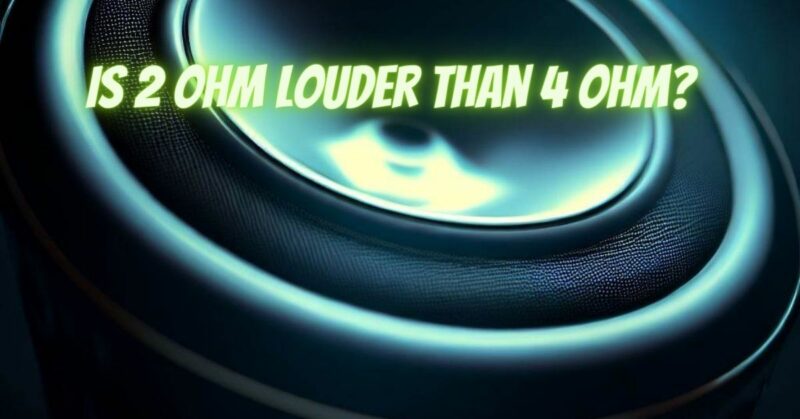The world of audio is rich with nuances, and the choice of speaker impedance is a crucial factor that can influence sound performance. A common question that arises is whether a 2-ohm speaker is inherently louder than a 4-ohm speaker. This query often leads to confusion and misconceptions. This article delves into the complexities of speaker impedance and sound output, clarifying the relationship between 2-ohm and 4-ohm speakers in terms of loudness and overall audio quality.
Understanding Speaker Impedance
Speaker impedance, measured in ohms, is the electrical resistance a speaker offers to the amplifier’s current. It’s a key parameter that affects how power is distributed and how sound is reproduced.
2-Ohm vs. 4-Ohm: The Volume Misconception
The notion that a 2-ohm speaker is inherently louder than a 4-ohm speaker is a misconception that requires clarification. Loudness is influenced by several factors beyond just impedance.
Power Distribution and Loudness
While a 2-ohm speaker might draw more current from the amplifier compared to a 4-ohm speaker, this doesn’t guarantee that it will be louder. Loudness is determined by a combination of factors, including sensitivity, power handling, and the amplifier’s capabilities.
Sensitivity and Efficiency
Sensitivity, measured in decibels (dB), indicates how efficiently a speaker converts electrical power into sound. A speaker with higher sensitivity will produce more sound with the same amount of power. Sensitivity can vary widely among speakers of different impedances.
Amplifier Power and Quality
The amplifier’s power output and quality play a vital role in determining loudness. An amplifier with more power can drive speakers to higher volumes, but it must be matched to the speaker’s impedance for optimal performance.
Speaker Quality and Design
The design and quality of the speaker’s drivers, enclosure, and overall construction impact its ability to reproduce sound accurately and at high volumes. Higher quality components often result in better sound reproduction.
Choosing the Right Speaker Impedance
When choosing between 2-ohm and 4-ohm speakers, consider the following:
- Amplifier Compatibility: Ensure that your amplifier can handle the speaker’s impedance and power requirements.
- Listening Environment: Consider the environment in which you’ll use the speakers. Are you setting up a home theater, car audio system, or studio?
- Quality and Sensitivity: Evaluate the overall quality and sensitivity of the speakers to determine their potential loudness and sound quality.
The belief that a 2-ohm speaker is louder than a 4-ohm speaker is a misconception that doesn’t accurately reflect the complex factors influencing loudness. Impedance is just one part of the equation, with sensitivity, amplifier quality, and speaker design all playing significant roles. When selecting speakers, prioritize compatibility, quality, and intended use to ensure that your audio setup delivers the desired volume and sound quality.


